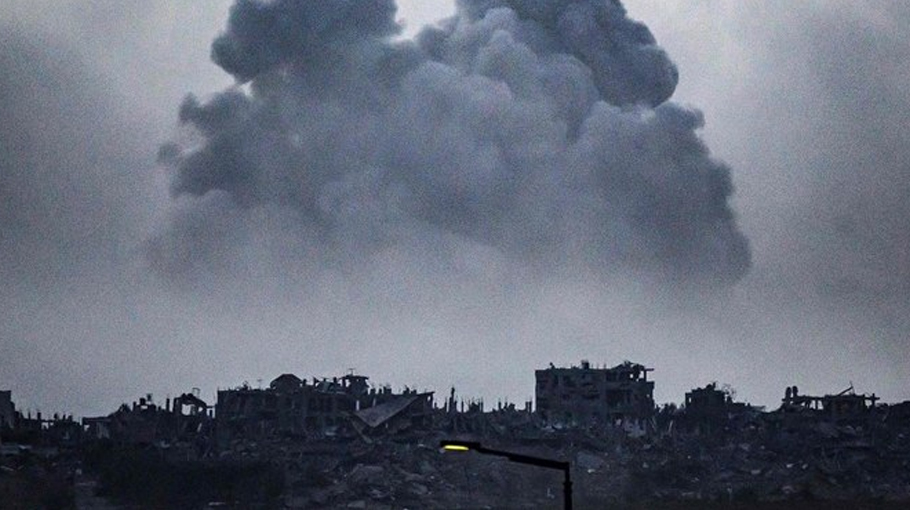How a diplomatic paradigm shift could bring peace

After nearly seven weeks of war, a breakthrough finally arrived with the four-day temporary pause that was announced by Israel and Hamas on Wednesday. This truce is a reduced version of what Hamas implied when it released two hostages a month ago.
The release of Yokheved Lifshitz and Nurit Yitzhak on Oct. 20 happened “under humanitarian grounds” and was “mediated” by Qatar, as indicated by Hamas. This was a message from Hamas that it wanted to negotiate, what it wanted to negotiate on and who it wanted to be represented by at the table.
It took the international community a month to give those messages their necessary weight. While Hamas would not have been very bothered without a truce, given the minimal damage it has suffered, the same cannot be said for Gaza’s civilians, who face an existential fate — a matter of life and death.Maintaining the truce or extending it will require tremendous efforts from the international community. Since the start of this war, the international community has been divided between two poles: a humanist duty to stop the death toll among Palestinian civilians and a political objective to dismantle Hamas and eliminate the threat it poses to Israel.
The decision by Western governments to overlook their values, diminish citizens’ rights and disregard the finding of the truth was the product of a failing, centralized foreign policy-making framework, which afforded Israel unwavering support and placed blind trust in a state that had little incentive to abide by international laws. This is indicative of a framework that relies on amplified inputs solicited from one side of the conflict, while overlooking the other.
Read More: Children must be protected from the worst effects of war
Often, this framework undermines states’ own objectives, especially as many have vested interests, and demonstrated action, in attending to the needs of both the conflicting parties. For instance, the US attempts to maintain a double-pivot, balanced stance in the conflict. It remains Israel’s biggest supporter, but it also provides significant humanitarian aid to Palestinians, averaging $600 million per year.
Despite America’s humanitarian support to the Palestinians, Jordanian public opinion — as indicated by early results from a poll currently being conducted by NAMA Strategic Intelligence Solutions — does not perceive the US as a major aid provider to the Palestinians. Instead, the prevailing belief is that Washington takes a fully pro-Israel stance.
Secretary of State Antony Blinken last month attempted to illustrate the US’ dual position in an op-ed for The Washington Post that was titled “Defending Israel is essential. So is aiding civilians in Gaza.” However, the statements he had earlier made in Israel, where he identified himself “as secretary of state, as a Jew, as a husband and a father,” deviated from that impartial position. Granted, Blinken has the right to identify himself in that manner, but the Palestinians also deserve a similar level of understanding, compassion and representation.
Urging representatives to be unbiased is not realistic, especially in the context of this particular conflict. One single mediator cannot possibly represent both sides of a conflict, at least not this one. Even for impartial bodies such as the UN, the use of one special representative, or an envoy, to mediate between conflicting parties does not enjoy an attractive record of success. It only takes one party to perceive a mere iota of bias to render the envoy’s efforts inept.
Hence, to address the challenges of this framework, fundamental reform is necessary. Such a paradigm shift ought to begin with depersonalizing foreign policy-making, with the aim of representing the interests of conflicting parties through different individuals, whose biases can be seen as valuable assets.
The key is to acknowledge that biases — all biases — can be constructive and should be taken into account. Therefore, rather than entrusting one representative with the impossible responsibility of acting impartially, the use of two envoys can effectively navigate this challenge, especially for states that believe in the two-state solution. In the case of the US, a proponent of the two-state solution and a proven supporter of both the Palestinians and the Israelis, such a revamped framework would not only be consistent with its foreign policy priorities and its stance in the conflict, but it would also spare it the challenge of balancing all the internal and external pressures.
A twofold stance, which ought to be the prime objective of an institutional mediator, should be mirrored by the use of two envoys, who can then convey inputs and feedback to and from the centralized decision-maker.
The current framework relies on amplified inputs solicited from one side of the conflict, while overlooking the other.
In the context of the US, there are many distinguished Arab Americans who hold key political and diplomatic positions, such as Hady Amr, the current State Department special representative for Palestinian affairs. Amplifying the role of someone of that caliber and profile to represent the pro-Palestine component of the US’ twofold stance would likely be embraced by Palestinians and Arabs.
When a group is represented by one of its own, their sense of affinity, understanding and trust is strengthened, knowing that their best interest is safeguarded. Once they feel adequately represented in such a manner, they are more likely to consider alternative solutions to their primary demands, transforming a fundamentally zero-sum conflict into a situation conducive to win-win outcomes.
This principle holds true for the two-state solution, which is the best win-win scenario brought to the table thus far. The success of a two-envoy effort hinges on the ability of the unitary decision-maker to consider both inputs equally. If and when a group’s interests or suffering are to be deemed more important than the other, then there is no discussion to be had and no resolution will ever be achieved.
Mohammed Abu Dalhoum is the president of MENAACTION and a senior research analyst at NAMA Strategic Intelligence Solutions.
Source: Arab News



